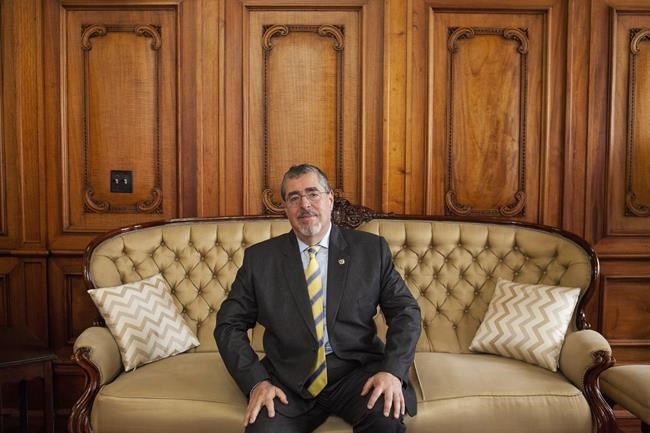
Guatemalan President Bernardo Arévalo poses for photos during an interview at the National Palace in Guatemala City, Thursday, Feb. 1, 2024. (AP Photo/Sandra Sebastian)
Republished February 01, 2024 - 6:07 PM
Original Publication Date February 01, 2024 - 11:41 AM
GUATEMALA CITY (AP) — President Bernardo Arévalo said Thursday that with his political party suspended, little support in congress and an attorney general in hot pursuit, he will appeal to the Guatemalan people to help him overcome the entrenched old guard and achieve the change he campaigned on.
“We are clear that in the current context, we depend on society and convincing them that together we begin to row,” Arévalo told The Associated Press in an interview two weeks after his inauguration. “We can’t depend on a political system where those criminal and patronage networks still lurk.”
Arévalo won the presidency in August, beating the establishment candidate by a comfortable margin. He is the son of a former president credited with implementing some of Guatemala’s key labor protections, but Arévalo’s strong showing in a crowded field was still a shock.
The politician with a background in academia and conflict resolution caught fire with a message of challenging the country’s entrenched power structure and resuming the fight against corruption.
The face of the resistance to change is Attorney General Consuelo Porras. Sanctioned by the U.S. government for allegedly undermining Guatemala’s democracy, Porras has used her office’s autonomy to pursue Arévalo and his party since he won a spot in the presidential runoff election last year.
Arévalo wants her out, but she has so far refused to go.
The president said Thursday that Porras' office “is where the perverse system remains anchored and we are looking for the legal means of resolving this.”
Her term runs through 2026.
“We’re not sure she’s going to finish her term because there are actions in congress and legal actions,” Arévalo said. “What interests us is that the Attorney General’s Office stops acting against the law and against the democratic institutionality of the state.”
Porras has denied that her office's investigations into how signatures were gathered for the registration of Arévalo's Seed Movement party and into electoral officials' handling of the election among others are politically motivated. The Organization of American States has argued otherwise.
Last week, she refused a meeting with Arévalo, instead releasing a video in which she asserted her office's autonomy and said she would not resign.
A spokesman for her office, Juan Luis Pantaleón, said Thursday he was unaware of Arévalo's comments, but that Porras' office had always acted in line with the law. He said that dismissing the investigations as politically motivated without seeing the evidence was mistaken. Evidence collected in the cases has not been shared publicly.
Pantaleón said Porras had invited Arévalo to an inter-institutional meeting next week.
With only days in power, Arévalo said the level of existing corruption was evident.
“There are ministries where you just have to open a drawer and (the corruption) jumps out at your face, because the arrogance about the impunity was such that they didn’t even try to hide it,” he said.
But he asks: “To whom would you take the complaints, to an entity in which there's no confidence?”
That's an issue for Guatemala's relationship with the United States, one of the foreign powers that kept pressure on the outgoing administration to ensure a smooth transition. In exchange, he said, the U.S. government wants a partner they can trust.
“If their worry is drug trafficking and transnational organized crime, they can't trust a corrupt government, nor the political parties that elect narco deputies and narco mayors,” Arévalo said.
As for U.S. concerns over immigration, Arévalo said the solution is Guatemala's development. “If the arrival of undocumented immigrants is a problem for them, the country's development is part of the answer that they need and it is precisely what we want to make happen,” he said.
Meanwhile, Arévalo recognizes that the Guatemalans already living in the U.S. are a key source of income — larger than exports or tourism — through the remittances they send home. In exchange, they should have some sort of political representation, he said, suggesting an overseas district be established through which they could choose congressional representation in Guatemala.
Speaking in the wood-paneled presidential office, Arévalo said that upon his inauguration his 98-year-old mother, Margarita de León, gave him advice: “Now you are president, respect your father's memory and may God enlighten you.”
Arévalo's father, Juan José Arévalo Bermejo, served as president in 1945-1951, ushering in what came to be known as Guatemala's “spring.” He later went into exile in Uruguay where the younger Arévalo was born.
____
Follow AP’s coverage of Latin America and the Caribbean at https://apnews.com/hub/latin-america
News from © The Associated Press, 2024